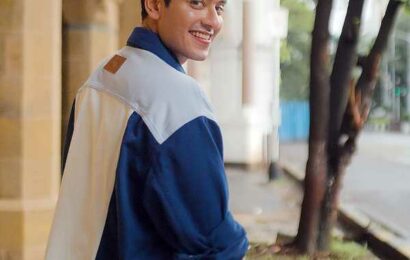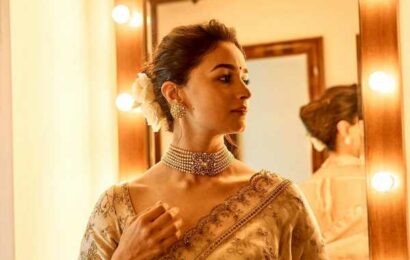‘We were shooting a sequence in which Shah Rukh was both the son and the father, so we had to shoot the son part and then wait for him to get the prosthetics done and come back and shoot the father part from different angles.’
‘It’s a lot of work to get all of that done.’
‘But he sat through all of it, with such patience and grace.’
Whether you know her from films as Taare Zameen Par (2008), Shor In The City (2010), and Mauli (2018) or television series like Ladies Special and Modern Love: Mumbai, odds are you have probably seen Girija Oak Godbole at some point in your content-watching journey.
She is currently in the limelight for playing a pivotal part in Shah Rukh Khan’s Jawan.
She was originally meant to play a different part in Jawan, and she explains to Rediff.com Contributor Mohnish Singh, “It was the part that Ridhi Dogra eventually played. They were looking for a known face for that part and I am glad she did it because she is so good in the film.”
Congratulations on the huge success of Jawan. How are you feeling?
Great! It’s amazing. It’s almost surreal.
It’s incredible to be a part of it even if it’s a small part.
How did you become a part of the film?
It was just like any other audition call I got from (Casting Director) Mukesh Chhabra’s office. I went in and did my audition.
It was supposed to be for some other part in the film, not one of the six girls.
After the first round of auditions, I got another call saying that both Mukesh Chhabra and (Director) Atlee wanted to test me for a different part.
So I went back in and gave another test.
Then I got a call saying that the director would like to meet you again, so I met Atlee. I was very excited about that itself because I am a huge fan of Tamil and Telugu cinema and my husband and I have watched almost all of Atlee’s films.
We had a chat and he told me about the film and about the fact that there would be a bunch of girls and he wasn’t sure if he wanted five or six girls at that point.
He said, ‘I am trying to find different faces and looking for something specific in each of them, so I don’t have a specific part for you yet because the three parts that have backstories have been decided… I am going to have to write something for you. So if you are okay with that, we will take this forward otherwise.’
I was more than happy to say why not because I knew the film would be a very special experience.
How often do you get to work with Shah Rukh Khan and to be part of the whole process? So I said yes.
Which character did you originally audition for?
It was the part that Ridhi Dogra eventually played.
They were looking for a known face for that part and I am glad she did it because she is so good in the film.
How was it meeting Shah Rukh Khan for the first time?
I had never met him before.
I have just been a huge fan of him, like most of us, having seen practically every film of his.
So there was this day when we knew that we would meet him because we were shooting a particular sequence. We knew he would be on set that particular day.
He came on set and walked up to each of us, individually, and gave us a hug and a little kiss on our foreheads and said, ‘Thank you so much for being a part of the film.’
It’s the first gesture that I witnessed from him and it was so warm and beautiful that I became a bigger fan of his.
Sharing screen space with Shah Rukh Khan for the first time can make any actor nervous. How was it for you?
Not at all. The anticipation of working with Shah Rukh Khan will make any actor nervous.
But on set, he makes you feel the most comfortable because he will get into it with you.
If you are supposed to pick up an object and put it somewhere or whatever, he himself will get it and be like, ’em>Accha bata mujhe, kya kar rahi hai?’
He will really get hands on with it.
If you want to do lines with him, he is happy to do that with you.
He loves conversing.
He will tell us tales and have a nice chat with you.
He doesn’t have that air that I won’t talk to anyone. It’s the opposite.
Your father Girish Oak is a well-known Marathi actor. Did that influence you to become an actor too?
No. I always looked at him and realised how little time he had with the family. I always thought it was a very insecure profession.
Initially, it looks great, but waiting for the right parts and opportunities is extremely challenging.
Also, I was a fairly bright student.
Although we had an actor in my family, I don’t come from a family of actors. My father is the only actor in my family, apart from me.
He is also a qualified doctor. He practiced medicine for a couple of years and after that, took up acting.
It was only much later in life that I did my first acting work, just for fun, at Prithvi Theatre. That’s when my eyes opened.
You have worked with two of the biggest superstars of Indian cinema, Aamir Khan in Taare Zameen Par and now Shah Rukh Khan in Jawan. What separates them from each other?
More than what separates them — because we know what separates them as they are very different in what they choose to do in films and how they are as people — I would like to talk about what’s common between them.
It’s love and passion they have for what they do.
When I was shooting for Taare Zameen Par, Aamir Khan was also directing the film and he used to be on set before all of us.
He would stay back on set after all of us would call it quits for the day.
He would plan the next day, sit with his ADs (Assistant Directors) and figure everything out.
He would be there for rehearsals.
He would be at it all the time.
There were times when we were shooting in that amphitheatre — the last sequence of the film — and the monitors would be very far away so we could not watch the shot.
Now we have portable monitors, but back then, that wasn’t there.
After shooting, you had to go see the shot in the monitors.
So he would run a good distance, climb down, climb up and go for a shot, as he was also acting in it.
The kind of dedication and commitment he had was amazing.
He is a star and you assume that a star is going to have some sort of a starry air and he is going to come on set at his own sweet time and take his own time before the shot. But that was not the case with Aamir.
And that is exactly with Shah Rukh Khan.
On set, there used to be a lot of prosthetic work for his character. There were days when he had to do both parts.
We were basically shooting a sequence in which he was both the son and the father, so we had to shoot the son part and then wait for him to go get the prosthetics done and come back and shoot the father part from different angles.
It’s a lot of work to get all of that done.
Your skin also gets irritated because of the hefty layers of make-up and prosthetics.
But he sat through all of it, with such patience and grace.
We shot the song Zinda Banda for about six days. We were dancing relentlessly for six days to a point when we thought our knees had started making sounds!
And there he was, all of 57, just as energetic as all of us, maybe more.
He was on set, every day, dancing next to us for all those six days.
That is what I found was common between them.
They are extremely happy and passionate with what they do.
After Taare Zameen Par, your second film Shor In The City came in 2011. Then, there was a long gap before you did another Hindi film. Was it because of lack of opportunities or you wanted to focus on Marathi cinema?
Honestly, I haven’t done Marathi films either.
After Shor In The City, I took a little break which became longer because I got married and had a child.
Also, it’s not like I was offered some 20 films and I didn’t say yes to them.
It’s not that I was offered great films.
But all this time, I kept doing theatre. I didn’t take any break from that.
I have a work-life balance because that’s what I choose. So I am a full-time mother as well as a working actor.
I also sing and do musicals.
I did a popular television series on Sony TV, called Ladies Special, which was very well received.
But yes, I didn’t have done a Hindi film per say, post Shor In The City and Qala (2022) which was a Netflix film.
After Jawan, your next release is The Vaccine War.
The Vaccine War has been a very special experience.
Working with Nana Patekar and Vivek Agnihotri has been an experience in itself.
I have known Nana and Pallavi Joshi since I was little, because of my father.
What a lovely connection we had on set.
Like Nana and I started improvising certain scenes together in a certain way because we had that closeness, that warmth.
He plays the director general of ICMR, the top boss, but if you see the film, you will know that I sort of get away with little tongue-in-cheek humour (laughs).
He looks at me like a daughter or like a mentee, so that sort of relationship really developed between us, which was beautiful.
Vivek sir has a very different way of working.
They were really lovely people, warm people who took care of us a lot. We all sat together and ate.
It was a really well thought and researched film.
Source: Read Full Article








